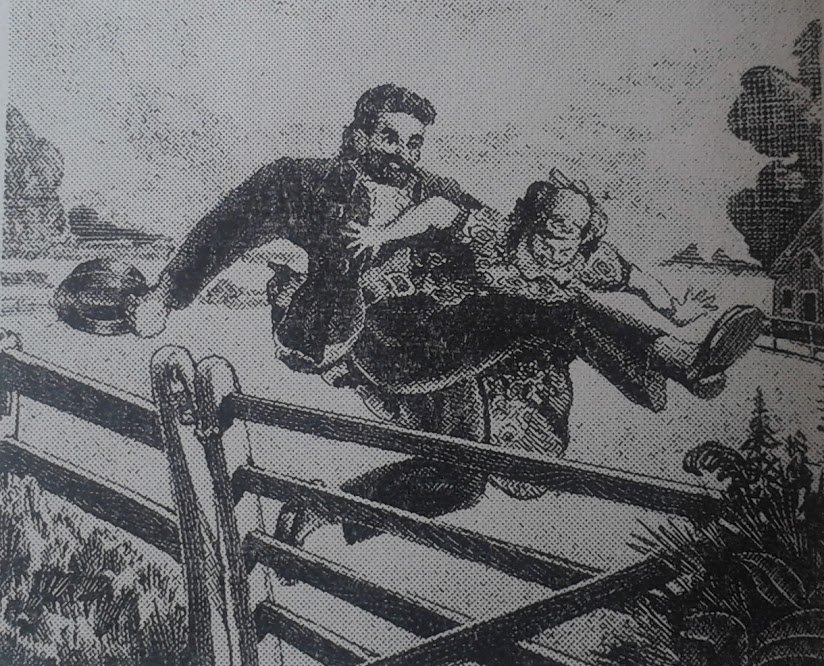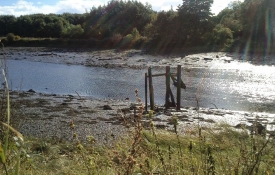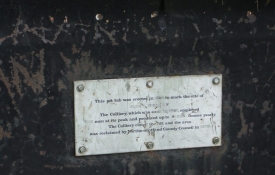Welcome to the Community View section of the website. This area is dedicated to articles of interest, community information and local topics that are submitted by members of the public or guest writers. It is also the main section dedicated to the Youth Media Group Project.

During the summer of 2015 there were many discussions on Social Media about the return of the statue of Willie Carr to his home in the Keel Row Shopping Centre after having been away to have repairs done on a broken leg.
"Elizabeth York, an old Blyth resident, has died this week at the age of 91. She was a girl 13 years of age when Willie Carr, the Blyth giant, died, and was a woman of 43 when the Crimea was fought. MH 17Jan1903"
The Shields Gazette in 1897 were campaigning to have his now faded tombsone in St Cuthbert's churchyard replaced.
| Shields Gazette 1897 |
For those people that weren't paying attention in Miss Worswick's history class when she did the lesson on Willie Carr here are some of the legendary feats attributed to him:
- Was good natured and was only said to have lost his temper on two occasions - some drunken sailors who disturbed his unwell wife and a peer of the realm who regretted upsetting Willie
- Jumped a five-bar-gate carrying a lass under his arm
- Carried a harpoon all the way from Blyth to Shields to fulfil an order
- Squeezed the blood from a respected prizefighter from down South in a pre-match handshake - the bloke threw in the towel quite sensibly before the fight even started
- Split a boat in two with his legs to escape the press gang and then swam back to shore
- Was the champion of Lord Delaval who had Willie's portrait painted
- Drank 84 glasses of gin and was still sober
- Carried the blue stone that now resides outside the Delaval Arms in Seaton Sluice when dozens of other men had failed
A baby was born at Hartley Old Engine, on
April 23, 1756, that was destined to cut a
great figure in the world in more senses than
one. Whether the auspices of his birth afforded any
foreshadowing of future greatness is not recorded; but
his early childhood must have furnished the buddings of
the stature, weight, and strength, which, by the time he
reached the years of manhood, had developed into the
qualities of a Hercules... He was a true, bold, clever, and witty fellow every inch a
man.
By the time he was seventeen years of age Carr was six
feet three inches in his stocking feet, and weighed sixteen
stone. He was serving his apprenticeship to a black-
smith, and, while the trade was one admirably adapted to
the development of his powers, it also brought him almost
daily opportunities of exhibiting the enormous muscular
energy and toughness on which his celebrity principally
rests. He did not, however, content himself with the
exertion of his marvellous bodily faculties, but so applied
his mind to the trade he had adopted that he became a
famous craftsman ; and when at length he set up at Blyth
on his own account, he turned out such capital harpoons
that the whalers of the North-Eastern ports could not
satisfy themselves that all was right with them unless
they had some of Blyth Willie's implements of fishing as
part of their equipment. His work, then, was mainly the
forging of harpoons.
Carr's lifting and throwing soon became objects of keen
interest to his neighbours far and near.
He could "put" a weight of sixty pounds a distance of
eight yards. When he was yet quite a young man, his
amazing powers naturally provoked emulation, or doubt,
or envy, at any rate competitive ambition of some sort
amongst those who had a name to lose, or were desirous
of winning one at his expense. One Mick Downey
belonged to the former class. He had a great reputation
for muscular prowess.But after a contemplative survey of Carr's form and
figure, as they revealed themselves in readiness for the
tussle, Mick discreetly retired without bringing matters
to the test of actual experiment.
In those merry old days Seaton Delaval Hall was a
centre of fashionable gaiety in all its phases. Lord Delaval,
naturally enough, was not a little proud to have as a
neighbour, and at first as a tenant, a man who was
superlative in one particular line. For the amusement
and edification of his South-Country guests he would
often have Willie up at the hall to display his magnificent
torso and his astonishing strength. On one occasion his
lordship invited Big Ben, a noted prizefighter of the day,
to contest the honours of "the ring" with the gigantic
man of Blyth. Everything was made ready for the sport
the ground marked out, the ropes stretched, the seconds
and umpire all in waiting. His lordship, wishing to
make matters as pleasant as possible, persuaded the
would-be pugilists to shake hands as a sign of friendship
before the struggle began. Big Ben
advanced to show good fellowship. Carr, always hearty
and energetic, whatever he took in hand, no sooner got a
grip of the boxer's fist than he put on the screw as if
working a vice, and squeezed his new friend's hand till
the blood spurted from the tips of his fingers. This was
quite enough for Ben. He was wise, as well as brave and
strong. Accordingly, he hinted to his second to
throw up the sponge before the business began. The gay
young bloods tried to hearten him to the fight by jeers
and bribes and other like incentives; but Ben quietly re-
marked that he should " prefer a kick from a horse to a
blow from such a fist as Carr's."
His lordship of Delaval evinced the genuine interest he
had in his humble friend, "the village blacksmith" by
having a splendid portrait taken of him, and hanging it
in the gallery of his ancestral home. Subsequently it was
transferred to the gallery at Gibside, and remained there
during the tenancy of the estate by Lord Tyrconnel.
Carr's fashionable patrons had occasionally more direct
and less pleasant proofs of his amazing strength than such
as they witnessed in experiment upon others. He early
won the nickname of Lord Haddo, from the circumstance
that, the nobleman of that name having struck him with
his whip on Morpeth race-course, Carr instantly dragged
him off his horse with such force and ease that his lord-
ship was not likely to repeat the insolence.
By the time he reached the age of 30, he had attained
his full development weighing 24 stone, and measuring 6
feet 4 inches in height. His brawny hands and mighty
arms were a sight to see and a caution to feel. It was
not mere fat, as in other memorably obese men and
women, but largely the solid bone and the leathery
cords of muscle that pulled the scale against 336 pounds
balance.
Another feat of his illustrates his humour quite as
much as his strength. He was one of the best tempered
men that ever lived, and never otherwise than peaceably
disposed.
On one occasion Willie happened to fall foul of a gang of
gipsies or vagrant muggers. These gentry menaced the
big man. By way of silencing them with a specimen of
what he could do if they carried matters to extremes, he
laid his big hands on their donkey as it was meekly
browsing on the thistles by the side of the tramway, and
quietly chucked it into an empty coal-waggon, leaving
his enraged enemies in great wonder at the feat, and in
great perplexity as to how they should recover their steed
from the deep truck.
Some of his useful feats are still remembered with a
sort of shuddering awe. In those days, as now, coal
trucks would sometimes derail off the line, and stoppage of
traffic occur as the natural consequence. Where, then,
was the lever to hoist them on to the track again? Well, if
it happened anywhere handy, no lever was so ready or so
useful as Carr's strong back and legs. He had but to
stoop beneath the slipped waggon till he could get a good
prise on it, and he then lifted it cleverly on to the rail
again. It is told among the long-shore men of Blyth, to
this day, how once five sailors belonging to the good ship
Minerva were puzzling their heads as to the best means
of removing their vessel's anchor with a piece of chain
cable attached, then lying on the beach. The anchor and
chain weighed half a ton, and, while they were wondering
how to get it away, Willie walked in upon the circle of
debate, and without more ado lifted up the iron, put it
over his shoulder, and trudged away with it to his father's
smithy.
Willie's powers of enduring fatigue or, rather, of con-
tinued labour without showing symptoms of exhaustion
were most extraordinary in the days of his full vigour.
He was once known to work for 132 consecutive hours,
then sleep 12 hours, and resume with unabated vigour for
120 hours more. His powers of consumption, as regards
victuals and drink, were on a par, of course, with the rate
at which he expended his strength. Carr certainly was not
a dissipated man in any sense, especially was he no
drunkard. It is
said of him that once upon a time business called him to
North Shields. When the business was finished, or
possibly by way of facilitating the affair, he swallowed
84 glasses of gin, and reached his home at Blyth the
same evening quite sober. Willie, to honour an order
hoisted a hundredweight of harpoons on
to his shoulders and marched off with them to North
Shields, ten good miles away. After such a feat, the
84 glasses of gin will perhaps stand a chance of being
swallowed by the public as having been swallowed by
him.
It is told that on one occasion he tucked a plump young
woman under his arm, and, thus handicapped, leaped a
five-barred gate.
Considering his remarkable physical powers, and also
the great demand for "likely fellows" at the end of the
last century and the early part of the present, it is not
surprising to learn that the Strong Man of Blyth was
again and again wanted to serve the King But Carr
had other views; he was fond of home fonder still of
liberty and honest toil. If the King wanted him, the
King's men would have to come and fetch him at
their peril. The press-gang was a permanent institution
in those days, prowling about seaports great and small,
and picking up hands for the navy.
They had evidently set their hearts on Willie, and
staked their professional pride on capturing him. But
they seldom got a fair chance with him, and when they
did his own wit and weight of fist made it no chance
at all. A friendly grip of his hand was generally suffi-
cient to elicit a, hearty farewell from any captain of
the press-gang whose valour had led him so far towards
the great man's capture.
One capital story is told of his actually getting caught,
and of his characteristic escape from the snares of the
King's fowlers. He could swim as well as he could
hammer. Having fallen into the gin set for him
by the cunning pressmen - possibly the snare was gin, as
that was his favourite drink and his own weakness
Carr was handcuffed and taken on board a boat lying in
the harbour; but when on his way to the tender lying off
the coast, he inquired of the coxswain, in a comical way,
whether that worthy could swim. "Why do you ask
such a question?" rejoined the officer, instead of giving a
straightforward answer. "Because" said the giant, " e
shall all be swimming just now" And before the warn-
ing was well out of his mouth, he bowed himself, as did
Sampson of old in the temple of Philistia, and split the
boat in two with the strain of his back and legs. In a
sea, while the giant was leisurely paddling himself back
to liberty and home.
Up to the end of his sixty-second year, Carr preserved a con-
siderable measure of the force that had made him famous.
But in that year he was seized with paralysis, and,
though he lingered seven years longer, he never more left
his bed. His ingenuity as a mechanic came to his relief
when thus helplessly bedridden. Having made for him-
self what was in all probability the first iron bedstead
ever manufactured, he contrived a clever and easily
worked apparatus by which he could lift himself in and
out of bed, or in such a way as to change his position
without troubling anyone to help him. He finally rested
from life's troubles and turmoil on 6th September, 1825.
glad he is back




